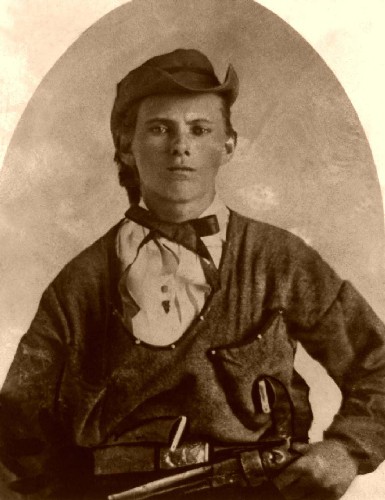Why We Enjoy Outlaw Songs
There’s a reason the Outlaw Music of Country and Americana stations has such an appeal to us. They are generally ballads, and they tell stories of bad boys and girls that history and mythology has made into heroes. Take for example, famous outlaws like Jesse James. We know about him, but we don’t know what MADE him. I recently purchased a book entitled, The Civil War in the Ozarks by Phillip W. Steele and Steve Cottrell, and it gave me some insights into Jesse James I wanted to share with you. In a future post, I’ll try to make a list of the Outlaw songs I like.
The philosophical war between Northern and Southern views had been going on both verbally and physically several years before the Civil War actually started. The Civil War in the Ozarks says this of James:
”Jesse James was only 14 when the war began and was too young to be accepted by the Confederate Army or by Quantrill’s irregular forces. While plowing in a field behind his home in late May of 1863, young Jesse was suddenly surrounded by a mounted detail of Union soldiers. Because he refused to answer after being repeatedly asked about the location of his brother Frank and Quantrill’s camp, the detail severely whipped Jesse with bull whips and left him bleeding in the field. Half crawling to the house, he found his stepfather Reuben hanging from a tree and his mother desperately trying to cut him down while his young sister Susan and Sarrah Samuel watched in Horror. Dr. Samuel had been left hanging by the Federal [Yankee] party after several unsuccessful attempts to get information from him about his stepson’s whereabouts. He did not die from the hanging but oxygen had been deprived from his brain so long he would remain mentally incapacitated the rest of his life. Although Jesse was now only 15 years of age, the tragic events of the day inspired him to wait no longer and he left to join Quantrill’s ranks.”
After Jesse James became a Confederate guerrilla fighter, his leadership and fighting abilities were recognized quickly. Here are some notable incidents that I gleaned from Cottrell’s book: Jesse James was the one who shot down the Federal Major Johnson who with a force of mounted infantry had attempted to capture Bloody Bill Anderson. The Federal forces were decimated ferociously near Centralia, Missouri. Jesse and his brother Frank also rescued the captured General Jo Shelby and his staff from the Federals in Arkansas. Jesse eventually drifted into Indian Territory and participated in battles at Cabin Creek and other localities. He and others settled for a while in Scyene, Texas, near Dallas with the Shirley family. (John Shirley’s beautiful daughter, Myra Maebelle, would later be known as Belle Starr). When he heard the war ended, Jesse and a “sizable group of his associates” approached A Federal garrison at Lexington, Missouri, under a white flag, with plans to surrender. Jesse was seriously wounded with a “bullet in his right lung and in one leg.” James suffered greatly from these wounds the rest of his life. There is no doubt that this was another setback that spurred him on down the outlaw trail.
Jesse James was “never again known to officially surrender.”
This photo of James was taken in Platte City, Missouri in 1864 and shows him in typical guerrilla uniform and carrying three pistols.

Jesse James, Platte City, Missouri, July 1864
Is there any wonder why this boy refused to make peace with the Yankees and became an outlaw and a killer? Another of the many untold stories of history.
Here are the lyrics for a song written by Warren Zevon that I learned from Johnny Oneal when I played bass guitar with him (If you don’t know about Johnny and his music, you can read about him here.) I also perform the song when I do my own Americana show.
Frank and Jesse James
On a small Missouri farm
Back when the west was young
Two boys learned to rope and ride
And be handy with a gun
War broke out between the states
And they joined up with Quantrill
And it was over in Clay County
That Frank and Jesse finally learned to kill
CHORUS
Keep on riding, riding, riding
Frank and Jesse James
Keep on riding, riding, riding
‘Til you clear your names
Keep on riding, riding, riding
Across the rivers and the range
Keep on riding, riding, riding Frank and Jesse James
After Appomattox they were on the losing side
So no amnesty was granted
And as outlaws they did ride
They rode against the railroads,
And they rode against the banks
And they rode against the governor
Never did they ask for a word of thanks
REPEAT CHORUS
Robert Ford, a gunman
Did exchange for his parole
Took the life of James the outlaw
Which he snuck up on and stole
No one knows just where they came to be misunderstood
But the poor Missouri farmers knew
Frank and Jesse do the best they could
REPEAT CHORUS
